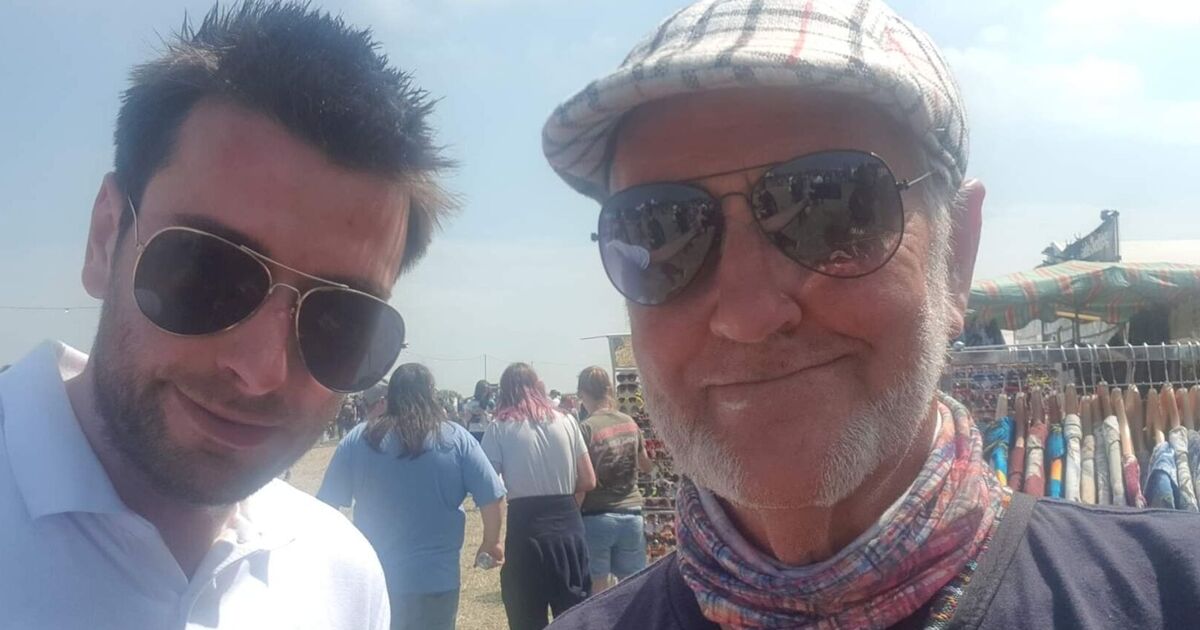I had no idea when we posed for this photo in a packed festival crowd that anything was wrong.
I remember thinking how amazing it was that my dad, at the age of 69, was still going to music festivals with me. Not only that, but he absolutely rocked out to Guns n Roses at Download Festival while managing to drink his son, then 29, under the table too.
My dad had always been active but I was so impressed that he managed to attend five full weekend rock and roll festivals in a row, sleeping in a tent in a field, in his late 60s, while staying the life of the party, making friends, dancing in congas and generally embarrassing his son by being much funnier and more interesting than me.
Just a few months later, my dad was dead, and I didn’t spot the signs early on.
Signs of a brain tumour I missed early on
Withdrawn personality
It started when my dad came to visit. He would often pop over to see me and help tend my garden or do some DIY because I’m incapable of so much as hammering a nail.
But one day he came over, he was not himself. He wandered out into the garden alone, and I found him stood in front of the raspberries, just staring at them. He couldn’t tell me what was wrong, or didn’t seem to know himself. But something was ‘off’.
‘Senility’ and struggle with daily tasks
This was about October, and I joked that dad was going ‘senile’ in his old age. Things got worse, and the next time I saw dad, he was asking me to take him to Meadowhall Shopping Centre to find a magazine to explain how to use his new phone, because he couldn’t figure it out. I thought this was just my dad being a bit ‘old’, but he’d always been good with tech, so it struck me as odd. Here, he turned to me and said something eerily foreshadowing: “Alexander, I feel like my brain is failing.”
Deeper confusion and the ‘water infection’ misdiagnosis
This developed into a deeper confusion. I remember we had to cut Bonfire Night celebrations short because dad was acting really oddly. We rushed him to a last minute GP appointment, where the doctor told us he had a water infection and this was causing his confusion. Apparently, symptoms of a water infection can include severe confusion and a muddled mind. The doctor gave him a course of antibiotics and sent us away – and at this time the real cause never crossed our minds.
The real diagnosis from 111
The final straw came about 10 days later. It was a Saturday night and my dad was still acting oddly. He’d had his antibiotics and seemed no better. I ended up calling the NHS 111 service while I was with my dad, and after they spoke to him, they booked us an appointment that night at Sheffield’s Northern General. There, my dad still acted oddly during the assessment. They kept him in overnight for scans. I have a vivid memory of being told my dad had walked around the ward, trying to give his money away to strangers.
It was the next night, when I came to visit, that the doctors gave us the devastating diagnosis: three large glioblastoma ‘butterfly’ brain tumours, across the brain, which would be inoperable.
The best case was six months. It was at least some comfort that if we’d moved any faster, the tumours – due to their position on the brain – still would have been inoperable, so there is nothing we could have done.
They gave him six months but dad battled to almost a full year from the day of his diagnosis.
The tumour pressing on nerves in the brain is what caused the confusion, and they gave him daily pills to reduce the swelling, along with chemo and radiotherapy, so for the first few months at least, dad was very upbeat, and not as confused as before, even if he’d never be the happy-go-lucky festival-goer rock dad again.
While these types of tumours are rare, they are very fast growing, so the best chance of survival is spotting the symptoms as early as possible and hoping they’re in a position that can be operated on.












